Police Lieutenant Colonel Chatchai Settheepanlarn requested a transfer to head the K9 unit of the Royal Thai Police because he feels it has great significance to the security of the country.
The old saying that dogs are man’s best friend couldn’t be more true than when applied to the Thai Police Dog (K9) unit.
“Since it was established in 1954, the unit has played a major part in solving and preventing many important crimes throughout the country,” explains Police Lieutenant Colonel Chatchai Settheepanlarn, who is currently in charge of training. But despite its distinguished history, the unit has not received much recognition.
“Not too many people know about us. I would like to make the K9 unit more known to the general public. Everyone should know how the dogs are beneficial to the country,” said Pol Lt Col Chatchai, who requested a transfer to the post in 2006. This was somewhat unusual, as not too many policemen actually want to work with dogs.
“I’ve always loved animals, especially dogs. I wanted to improve and develop the police K9 unit because it has great significance to the security of the country. I like this job and enjoy the challenges,” added the officer, whose dream from childhood was to become a police officer.
“I think that the police uniform is very sacred when worn. I feel that I am the guardian of the public peace, taking away anxieties and helping provide happiness for the people. I am very proud.”
The old saying that dogs are man’s best friend couldn’t be more true than when applied to the Thai Police Dog (K9) unit.
“Since it was established in 1954, the unit has played a major part in solving and preventing many important crimes throughout the country,” explains Police Lieutenant Colonel Chatchai Settheepanlarn, who is currently in charge of training. But despite its distinguished history, the unit has not received much recognition.
“Not too many people know about us. I would like to make the K9 unit more known to the general public. Everyone should know how the dogs are beneficial to the country,” said Pol Lt Col Chatchai, who requested a transfer to the post in 2006. This was somewhat unusual, as not too many policemen actually want to work with dogs.
“I’ve always loved animals, especially dogs. I wanted to improve and develop the police K9 unit because it has great significance to the security of the country. I like this job and enjoy the challenges,” added the officer, whose dream from childhood was to become a police officer.
“I think that the police uniform is very sacred when worn. I feel that I am the guardian of the public peace, taking away anxieties and helping provide happiness for the people. I am very proud.”
After I observed a regular morning training session at the K9 unit headquarters on Viphawadee-Rangsit Road in Bangkok and was given a tour of the main building, Chatchai began the interview with the basics:
“Many people don’t know what the internationally recognised term K9 actually means. It is a play on the word ‘canine’, meaning dog.
“Our unit is under the 191 Special Operations Division of the Royal Thai Police (RTP) Metropolitan Bureau.”
The immense affection between the K9 officers and their four-legged “best friends” is apparent during the training exercises. One can’t help but feel sympathy for these men whose reputations are tarnished almost daily by stories of a minority of rogue policemen reported in the press.
Chatchai loves every one of his dogs, but the most favoured is a two-year-old German shepherd named Nuclear. Maybe the surname Bomb should be added as well, judging from the behaviour of this large and quite beautiful animal.
“He is an attack dog,” Chatchai said. “The bottom line is that someone with bad intentions wouldn’t like to have any business with him.” It is quite amazing that such a dangerous looking animal would be so obedient to its master.
Pol Lt Col Chatchai talked of his goals for the K9 unit. “I have a plan to bring the police dog unit up to a higher standard and make it more effective within the RTP, but I am still missing a number of necessary ingredients, like new training equipment to replace what is old and broken.
“We need new pick-up trucks and containers to transport the dogs,” he continued. “The vehicles we have, due to their long service, allow water to enter when it rains.”
In addition, special protective clothing that covers the whole body, manufactured abroad, is needed to train the dogs properly.
Time, patience and devotion
“Since being assigned to the K9 unit, I've initiated two projects: Friends of Police K9s, and Stray Dogs Against Criminals,” said Pol Lt Col Chatchai. “The first project allows members of the public to bring their dogs here for training similar to that which our dogs receive. This is free of charge. After training, some of the dogs and their also well-trained owners may become K9 volunteers - “Silver Canines” – to help local police in searching for drugs and other jobs as requested.
“Many people don’t know what the internationally recognised term K9 actually means. It is a play on the word ‘canine’, meaning dog.
“Our unit is under the 191 Special Operations Division of the Royal Thai Police (RTP) Metropolitan Bureau.”
The immense affection between the K9 officers and their four-legged “best friends” is apparent during the training exercises. One can’t help but feel sympathy for these men whose reputations are tarnished almost daily by stories of a minority of rogue policemen reported in the press.
Chatchai loves every one of his dogs, but the most favoured is a two-year-old German shepherd named Nuclear. Maybe the surname Bomb should be added as well, judging from the behaviour of this large and quite beautiful animal.
“He is an attack dog,” Chatchai said. “The bottom line is that someone with bad intentions wouldn’t like to have any business with him.” It is quite amazing that such a dangerous looking animal would be so obedient to its master.
Pol Lt Col Chatchai talked of his goals for the K9 unit. “I have a plan to bring the police dog unit up to a higher standard and make it more effective within the RTP, but I am still missing a number of necessary ingredients, like new training equipment to replace what is old and broken.
“We need new pick-up trucks and containers to transport the dogs,” he continued. “The vehicles we have, due to their long service, allow water to enter when it rains.”
In addition, special protective clothing that covers the whole body, manufactured abroad, is needed to train the dogs properly.
Time, patience and devotion
“Since being assigned to the K9 unit, I've initiated two projects: Friends of Police K9s, and Stray Dogs Against Criminals,” said Pol Lt Col Chatchai. “The first project allows members of the public to bring their dogs here for training similar to that which our dogs receive. This is free of charge. After training, some of the dogs and their also well-trained owners may become K9 volunteers - “Silver Canines” – to help local police in searching for drugs and other jobs as requested.
|
The second programme is to train stray dogs to help the police for various purposes, such as to apprehend suspects. Chatchai admitted, however, that to train these dogs is not easy. It requires a lot of time, patience and devotion, but, he insists, it can be done.
He is also involved in publicising the benefits of the K9 unit to the general public. Asked how many dogs the unit has, the officer replied: “I can’t tell you that because it is secret. This information could benefit the criminals. What I can say is that the number of personnel and dogs in the unit is not sufficient, when considering our responsibility and the area of operation, which covers not only Bangkok but sometimes the whole country.” “Dogs are very useful for the owner who knows their value. They can be used in many roles. Sometimes they can save the lives of policemen, as in the three restive southern Thai provinces. If we had enough dogs, we wouldn’t lose as many lives as we do today. Police dogs help both in the prevention and suppression of crimes.” Pol Lt Col Chatchai said that dogs for training are normally obtained from dog farms, aged less than one year old but over four months. Only male dogs are used because females are “not so reliable.” |
A committee evaluates the dogs and chooses them for certain functions according to their characteristics.
“For patrolling and crowd control, for instance, a dog must be brave in nature, agile, and not afraid of loud noises. He must not be afraid of people, and not easily excited. He must possess a strong will to work and have a good sense of awareness so that he is fully alert while on duty. He must possess the characteristics of a fighter and be strong.”
The dogs are trained for three months in basic courses and another three months or so in advanced courses. At about 18 months old, they will be assessed and tested. If they pass, they will enter service as Third Class K9s. They will be promoted to Second Class after three years in service and to First Class after another three years. After another two years on duty, they will retire at about nine years of age.
“For patrolling and crowd control, for instance, a dog must be brave in nature, agile, and not afraid of loud noises. He must not be afraid of people, and not easily excited. He must possess a strong will to work and have a good sense of awareness so that he is fully alert while on duty. He must possess the characteristics of a fighter and be strong.”
The dogs are trained for three months in basic courses and another three months or so in advanced courses. At about 18 months old, they will be assessed and tested. If they pass, they will enter service as Third Class K9s. They will be promoted to Second Class after three years in service and to First Class after another three years. After another two years on duty, they will retire at about nine years of age.
German Shepherds and Labrador Retrievers are the two types of dogs used most. According to Pol Lt Col Chatchai, these are considered the two best breeds for the purpose all over the world, whether by police, military security companies. The German Shepherd a multi-purpose dog, capable of doing many jobs. They are the best for patrolling, crowd control and protection.
As for Labradors, they have extremely sensitive smelling capabilities and are also very friendly with humans. To sniff out drugs, other breeds such as Beagles are sometimes used, and even Thai dogs are currently in the process of being trained.
Each dog is specially trained for only one important area-to sniff for drugs or explosives, to help in crowd control and patrol duties, to help identify suspects, and so on.
Pol Lt Col Chatchai said that no machine, no matter how sophisticated, can replace police dogs.
“Machines can break down or can be ignored, but not the dogs. They are faithful and have perfect scent, 40 times more sensitive than humans. They are also very hard to cheat, for example by using pepper spray. We train them so that they can distinguish every scent. These dogs can’t be tricked.”
Chatchai pointed out that if the drug is concealed in a person, the dog will not attack or bite but will sit beside or keep follow the suspect.
“There’s a close bond between trainers and dogs. Usually, both stay together during the dog’s working life. The trainer must love the dog, be patient and sensitive of his feelings.”
He said they don’t reward the dogs with food for especially good performance, as they are already well-fed and in general very well cared-for. But the unit chief said he would like to reward them by obtaining better equipment for them to play and learn.
Pol Lt Col Chatchai said his unit stays very busy, working around the clock if needed. They get half a dozen requests per day for dogs from all over Thailand, and also participate in searches at airports, embassies and prisons.
As for Labradors, they have extremely sensitive smelling capabilities and are also very friendly with humans. To sniff out drugs, other breeds such as Beagles are sometimes used, and even Thai dogs are currently in the process of being trained.
Each dog is specially trained for only one important area-to sniff for drugs or explosives, to help in crowd control and patrol duties, to help identify suspects, and so on.
Pol Lt Col Chatchai said that no machine, no matter how sophisticated, can replace police dogs.
“Machines can break down or can be ignored, but not the dogs. They are faithful and have perfect scent, 40 times more sensitive than humans. They are also very hard to cheat, for example by using pepper spray. We train them so that they can distinguish every scent. These dogs can’t be tricked.”
Chatchai pointed out that if the drug is concealed in a person, the dog will not attack or bite but will sit beside or keep follow the suspect.
“There’s a close bond between trainers and dogs. Usually, both stay together during the dog’s working life. The trainer must love the dog, be patient and sensitive of his feelings.”
He said they don’t reward the dogs with food for especially good performance, as they are already well-fed and in general very well cared-for. But the unit chief said he would like to reward them by obtaining better equipment for them to play and learn.
Pol Lt Col Chatchai said his unit stays very busy, working around the clock if needed. They get half a dozen requests per day for dogs from all over Thailand, and also participate in searches at airports, embassies and prisons.
Behind the story:
It was quite surprising to see the main building of the K9 unit in a process of dilapidation, with water leaking in several places. I was told that the unit was lacking funds for repairs and essential items. Despite that, all police dog handlers continued to give the dogs the best care and training possible. Both trainers and dogs were ready for action 24/7. I witnessed a training session and was truly amazed at what these beautiful animals are capable of.
Frankly, I felt pity for the police officers living in apartments at the K9 compound with their families. I wish people who criticize the police could see with their own eyes the dedication these officers display and the sacrifices they make in order to protect the public. Hopefully, the Royal Thai Police will assign more resources to this deserving unit.
It was quite surprising to see the main building of the K9 unit in a process of dilapidation, with water leaking in several places. I was told that the unit was lacking funds for repairs and essential items. Despite that, all police dog handlers continued to give the dogs the best care and training possible. Both trainers and dogs were ready for action 24/7. I witnessed a training session and was truly amazed at what these beautiful animals are capable of.
Frankly, I felt pity for the police officers living in apartments at the K9 compound with their families. I wish people who criticize the police could see with their own eyes the dedication these officers display and the sacrifices they make in order to protect the public. Hopefully, the Royal Thai Police will assign more resources to this deserving unit.

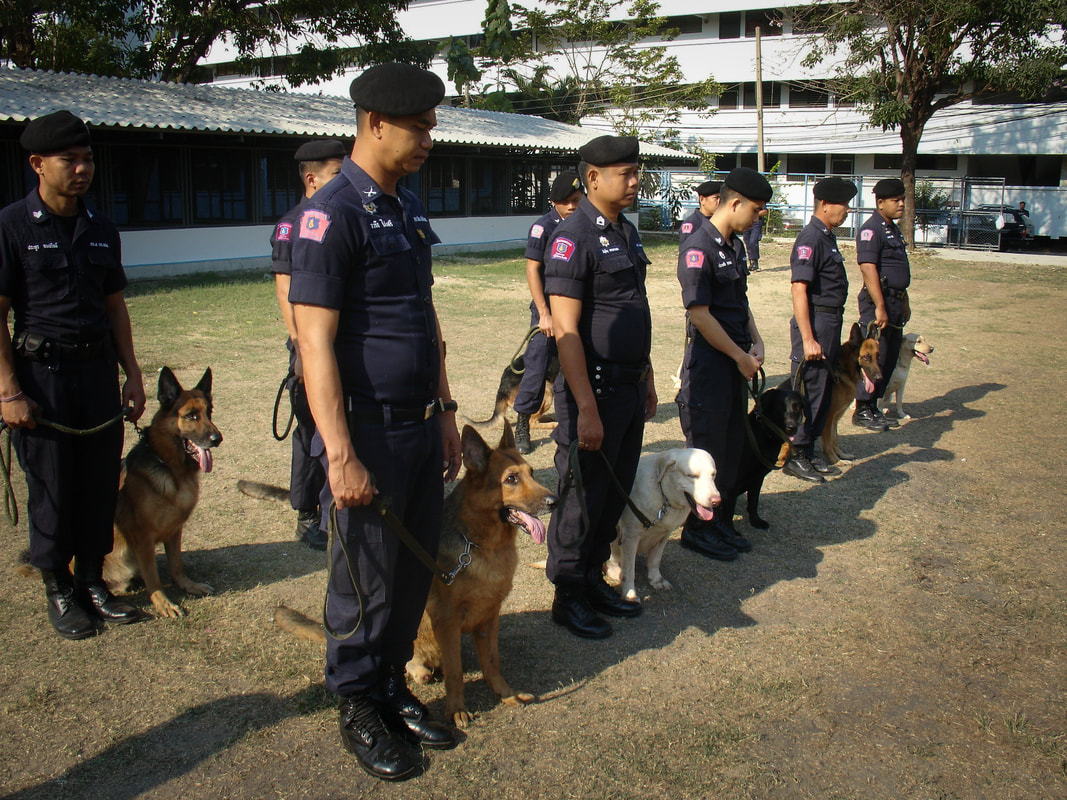
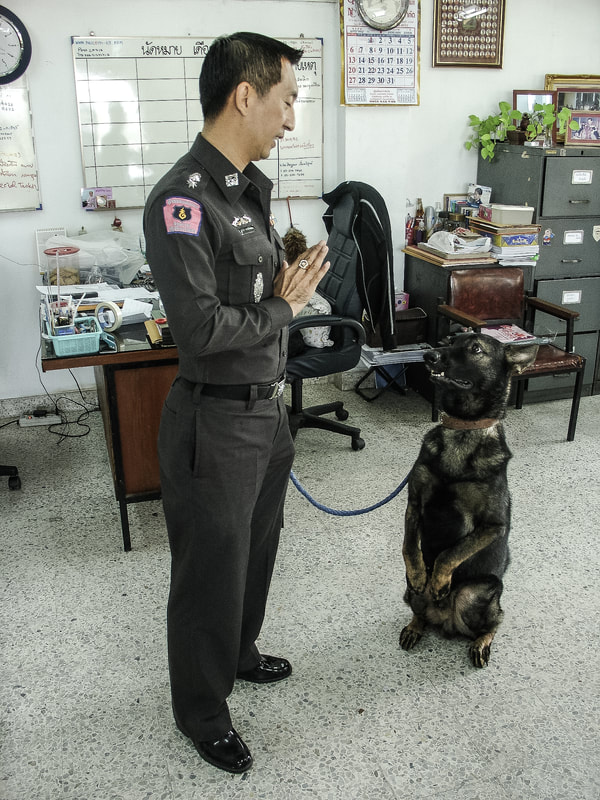
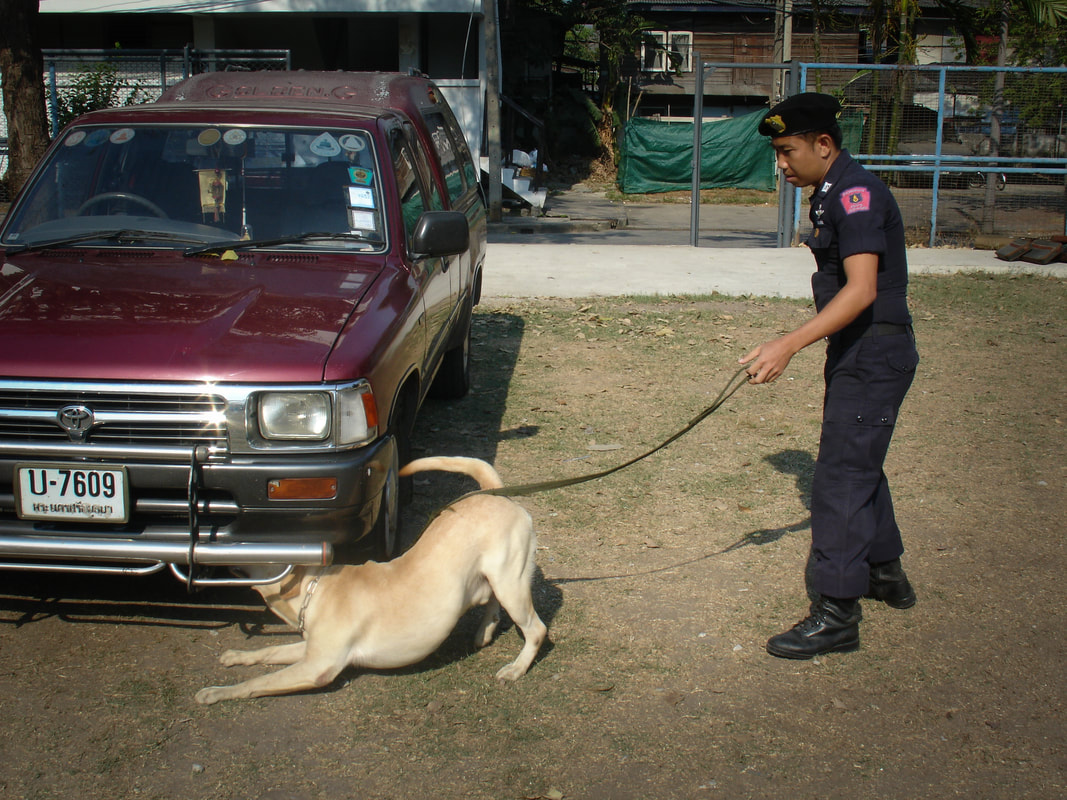
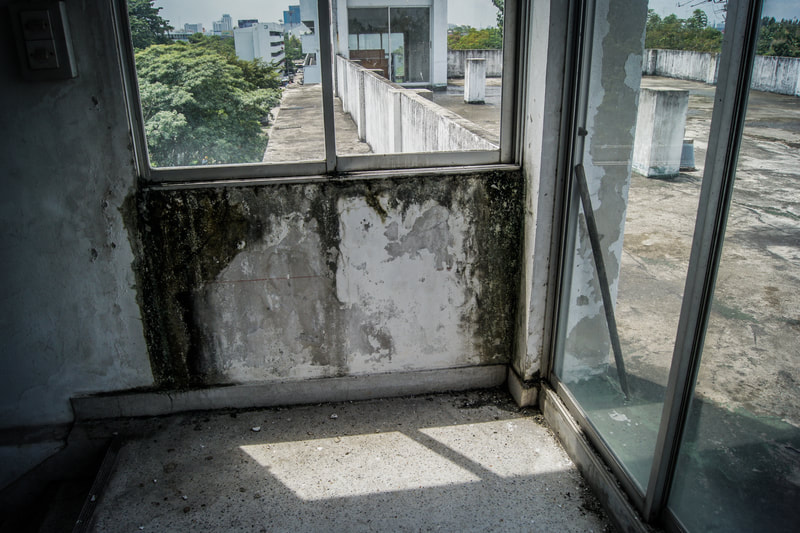
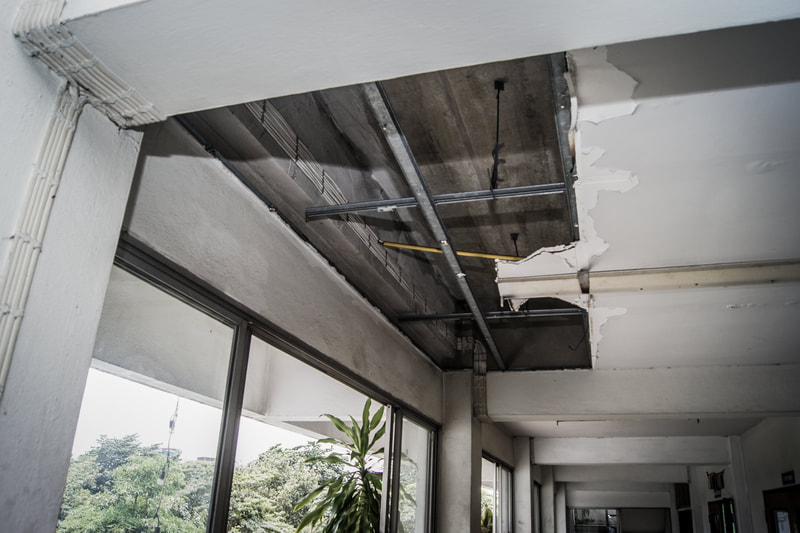
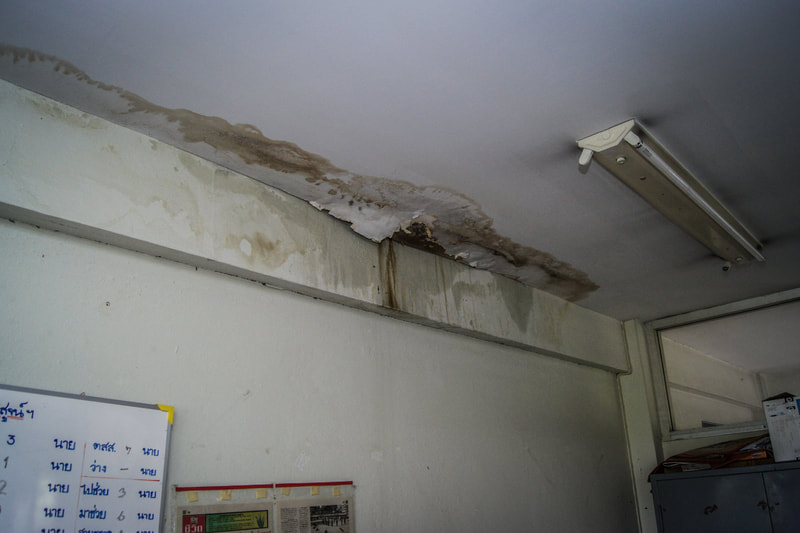
 RSS Feed
RSS Feed
















